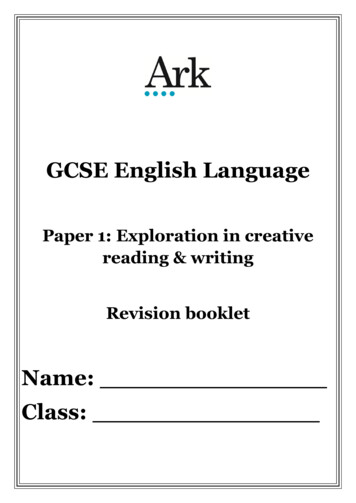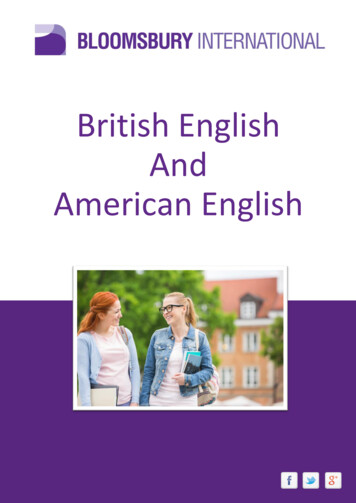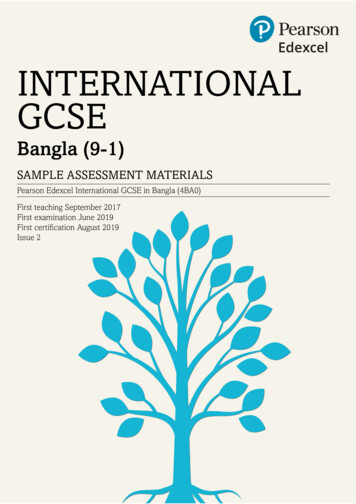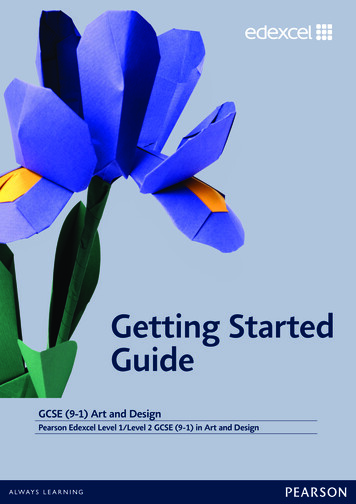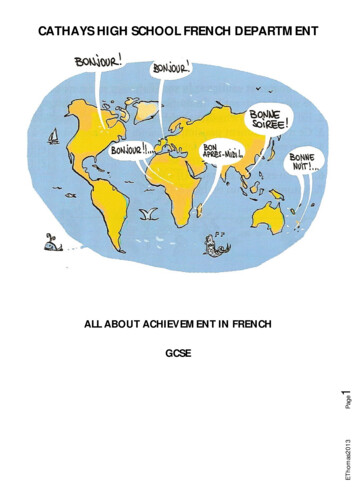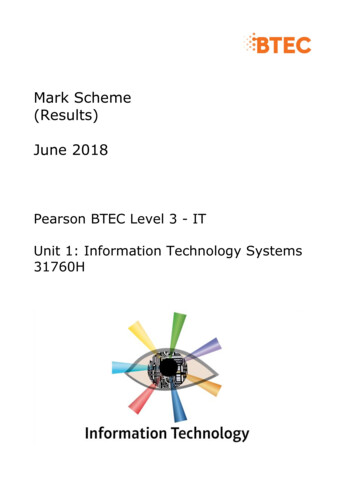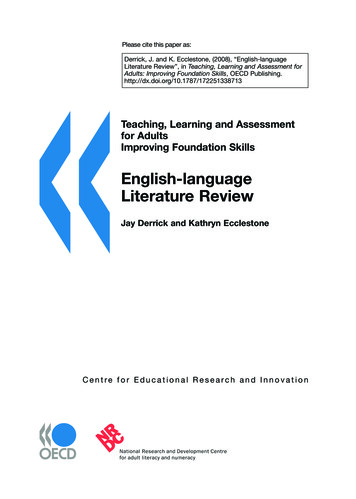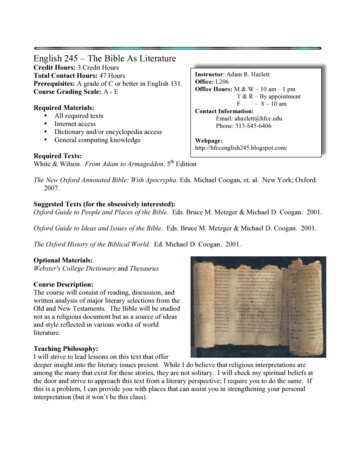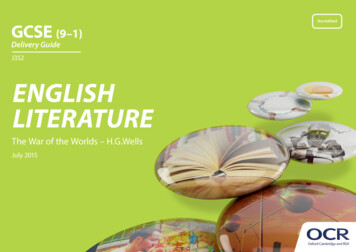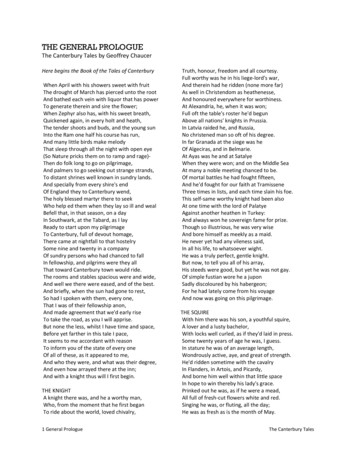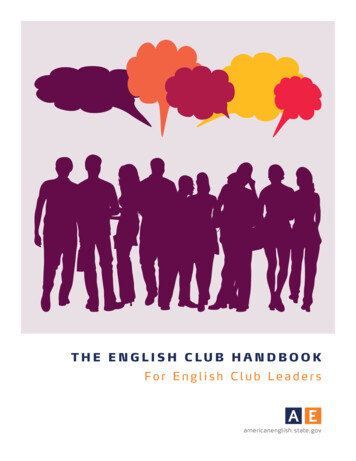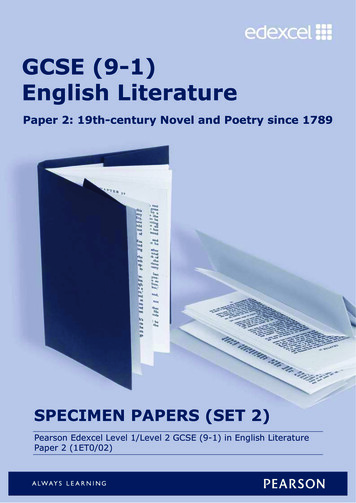
Transcription
GCSE (9-1)English LiteraturePaper 2: 19th-century Novel and Poetry since 1789SPECIMEN PAPERS (SET 2)Pearson Edexcel Level 1/Level 2 GCSE (9-1) in English LiteraturePaper 2 (1ET0/02)
IntroductionThis specimen paper has been produced to complement the sample assessmentmaterials for Pearson Edexcel Level 1/Level 2 GCSE (9-1) in English Literature and isdesigned to provide extra practice for your students. The specimen papers are part of asuite of support materials offered by Pearson.The specimen papers do not form part of the accredited materials for this qualification.
General marking guidance All candidates must receive the same treatment. Examiners must mark the lastcandidate in exactly the same way as they mark the first.Mark schemes should be applied positively. Candidates must be rewarded for whatthey have shown they can do rather than penalised for omissions.Examiners should mark according to the mark scheme — not according to theirperception of where the grade boundaries may lie.All the marks on the mark scheme are designed to be awarded. Examiners shouldalways award full marks if deserved, i.e. if the answer matches the mark scheme.Examiners should also be prepared to award zero marks if the candidate’s response isnot worthy of credit according to the mark scheme.Where some judgement is required, mark schemes will provide the principles by whichmarks will be awarded and exemplification/indicative content will not be exhaustive.When examiners are in doubt regarding the application of the mark scheme to acandidate’s response, a senior examiner must be consulted before a mark is given.Crossed-out work should be marked unless the candidate has replaced it with analternative response.Candidate’s responses need to provide evidence that meets the whole of the level, andpreceding levels in a levels-based mark scheme, before being considered against ahigher level.Marking guidance – specific The marking grids have been designed to assess student work holistically. The gridsidentify which Assessment Objective is being targeted by each bullet point within thelevel descriptors.When deciding how to reward an answer, examiners should consult both the indicativecontent and the associated marking grid(s). When using a levels-based mark scheme,the ‘best fit’ approach should be used.Examiners should first decide which descriptor most closely matches the answer andplace it in that level.The mark awarded within the level will be decided based on the quality of the answerand will be modified according to how securely all bullet points are displayed at thatlevel.In cases of uneven performance, the points above will still apply. Candidates will beplaced in the level that best describes their answer according to each of theAssessment Objectives described in the level. Marks will be awarded towards the topor bottom of that level depending on how they have evidenced each of the descriptorbullet points.Examiners of GCSE English Literature should be mindful of the weighting ofassessment objectives within the mark grid. The proportion of marks is represented inthe indicative content and the levels-based mark scheme. Examiners must considerthis when making their judgements.
The mark grid heading identifies which Assessment Objective is being targeted byeach bullet point within the level descriptors.Indicative content is exactly that – it includes factual points that candidates are likelyto use to construct their answer. It is possible for an answer to be constructed withoutmentioning some or all of these points, as long as they provide alternative responsesto the indicative content that fulfil the requirements of the question. It is theexaminer’s responsibility to apply their professional judgment to the candidate’sresponse in determining if the answer fulfils the requirements of the question.For AO3, context is information which informs the understanding of a text. Candidateresponses should treat it in ways that are suitable to the text, the author and thespecific task. It is important that the contextual information provided is directlyrelevant, rather than being ‘bolt-on’, (general) context that does not illuminate theresponse to the particular question. Responses to particular questions should selectfrom relevant context to illustrate and develop their interpretation of what is requiredby the task. The examples in the indicative content section show the link betweentext, task and context. Points that make these links should be rewarded; generalstatements which do not support the interpretation should not.
Pearson Edexcel Level 1/Level 2 GCSE (9–1)English LiteraturePaper 2: 19th-century Novel and Poetry since 1789Specimen Papers (Set 2) for first teachingSeptember 2015Time: 2 hours 15 minutesPaper Reference1ET0/02Questions and Extracts BookletTurn overS50469A 2015 Pearson Education Ltd.1/1/1*S50469A*
BLANK PAGE2S50469A
Answer THREE questions:ONE question from Section AONE question from Section B, Part 1AND Question 11 in Section B, Part 2.The extracts and poems for use with Sections A and B are in this paper.SECTION A – 19th-century NovelPage1 Jane Eyre: Charlotte Brontë42 Great Expectations: Charles Dickens63 Dr Jekyll and Mr Hyde: R L Stevenson84 A Christmas Carol: Charles Dickens105 Pride and Prejudice: Jane Austen126 Silas Marner: George Eliot147 Frankenstein: Mary Shelley16SECTION B – Part 1 Poetry AnthologyPage8 Relationships189 Conflict2010 Time and Place22SECTION B – Part 2Page11 Unseen Poetry24S50469A3Turn over
SECTION A – 19th-century NovelAnswer ONE question in Section A.You should spend about 55 minutes on this section.You should divide your time equally between parts (a) and (b) of the question.Use this extract to answer Question 1.Jane Eyre: Charlotte BrontëIn Chapter 11 Jane Eyre arrives at Thornfield Hall and is met by Mrs Fairfax.‘How do you do, my dear? I am afraid you have had a tedious ride; John drives so slowly;you must be cold; come to the fire.’‘Mrs Fairfax, I suppose?’ said I.‘Yes, you are right: do sit down.’She conducted me to her own chair, and then began to remove my shawl and untie mybonnet strings: I begged she would not give herself so much trouble.‘Oh, it is no trouble: I dare say your own hands are almost numbed with cold. Leah, makea little hot negus and cut a sandwich or two: here are the keys of the store-room.’And she produced from her pocket a most housewifely bunch of keys, and deliveredthem to the servant.‘Now, then, draw nearer to the fire,’ she continued. ‘You’ve brought your luggage withyou, haven’t you, my dear?’‘Yes, ma’am.’‘I’ll see it carried into your room,’ she said, and bustled out.‘She treats me like a visitor,’ thought I. ‘I little expected such a reception; I anticipated onlycoldness and stiffness; this is not like what I have heard of the treatment of governesses;but I must not exult too soon.’She returned; with her own hands cleared her knitting apparatus and a book or two fromthe table, to make room for the tray which Leah now brought, and then herself handedme the refreshments. I felt rather confused at being the object of more attention than Ihad ever before received, and that, too, shown by my employer and superior; but as shedid not herself seem to consider she was doing anything out of her place, I thought itbetter to take her civilities quietly.‘Shall I have the pleasure of seeing Miss Fairfax to-night?’ I asked when I had partaken ofwhat she offered me.‘What did you say, my dear?’ I am a little deaf,’ returned the good lady, approaching herear to my mouth.I repeated the question more distinctly.‘Miss Fairfax? Oh, you mean Miss Varens! Varens is the name of your future pupil.’‘Indeed! Then she is not your daughter?’4S50469A
‘No – I have no family.’I should have followed up my first inquiry, by asking in what way Miss Varens wasconnected with her; but I recollected it was not polite to ask too many questions:besides, I was sure to hear in time.Question 1 – Jane Eyre1 (a) Explore how Brontë presents Jane’s arrival at Thornfield Hall.Give examples from the extract to support your ideas.(20)(b) In this extract, Jane Eyre asks questions about her pupil, Miss Varens.Explain how Adèle Varens is portrayed elsewhere in the novel.In your answer, you must consider: what Adèle Varens says and does what Jane learns about Adèle Varens.(20)(Total for Question 1 40 marks)S50469A5Turn over
Use this extract to answer Question 2.Great Expectations: Charles DickensIn Chapter 56 Pip visits the dying Magwitch in prison.‘Dear boy,’ he said, as I sat down by his bed: ‘I thought you was late. But I knowed youcouldn’t be that.’‘It is just the time,’ said I. ‘I waited for it at the gate.’‘You always waits at the gate; don’t you, dear boy?’‘Yes. Not to lose a moment of the time.’‘Thank’ee dear boy, thank’ee. God bless you! You’ve never deserted me, dear boy.’I pressed his hand in silence, for I could not forget that I had once meant to desert him.‘And what’s the best of all,’ he said, ‘you’ve been more comfortable alonger me, since Iwas under a dark cloud, than when the sun shone. That’s best of all.’He lay on his back, breathing with great difficulty. Do what he would, and love methough he did, the light left his face ever and again, and a film came over the placid lookat the white ceiling.‘Are you in much pain to-day?’‘I don’t complain of none, dear boy.’‘You never do complain.’He had spoken his last words. He smiled, and I understood his touch to mean that hewished to lift my hand, and lay it on his breast. I laid it there, and he smiled again, andput both his hands upon it.The allotted time ran out, while we were thus; but, looking round, I found the governorof the prison standing near me, and he whispered, ‘You needn’t go yet.’ I thanked himgratefully, and asked, ‘Might I speak to him, if he can hear me?’The governor stepped aside, and beckoned the officer away. The change, though it wasmade without noise, drew back the film from the placid look at the white ceiling, and helooked most affectionately at me.‘Dear Magwitch, I must tell you, now at last. You understand what I say?’A gentle pressure on my hand.‘You had a child once, whom you loved and lost.’A stronger pressure on my hand.‘She lived and found powerful friends. She is living now. She is a lady and very beautiful.And I love her!’With a last faint effort, which would have been powerless but for my yielding to it andassisting it, he raised my hand to his lips. Then, he gently let it sink upon his breast again,with his own hands lying on it. The placid look at the white ceiling came back, andpassed away, and his head dropped quietly on his breast.6S50469A
Question 2 – Great Expectations2 (a) Explore how Dickens presents Magwitch in this extract.Give examples from the extract to support your ideas.(20)(b) In this extract, Pip speaks of love.Explain the importance of love elsewhere in the novel.In your answer, you must consider: who shows love for someone else the effects of this love.(20)(Total for Question 2 40 marks)S50469A7Turn over
Use this extract to answer Question 3.Dr Jekyll and Mr Hyde: R L StevensonFrom ‘Story of the Door’ – Utterson and Richard Enfield are taking their regularSunday walk.Mr Enfield and the lawyer were on the other side of the bystreet; but when they cameabreast of the entry, the former lifted up his cane and pointed.‘Did you ever remark that door?’ he asked; and when his companion had replied in theaffirmative, ‘it is connected in my mind,’ added he, ‘with a very odd story.’‘Indeed?’ said Mr Utterson, with a slight change of voice, ‘and what was that?’‘Well, it was this way,’ returned Mr Enfield: ‘I was coming home from some place at theend of the world, about three o’clock of a black winter morning, and my way lay througha part of town where there was literally nothing to be seen but lamps. Street after street,and all the folks asleep – street after street, all lighted up as if for a procession and all asempty as a church – till at last I got into a state of mind when a man listens and listensand begins to long for the sight of a policeman. All at once, I saw two figures: one a littleman who was stumping along eastward at a good walk, and the other a girl of maybeeight or ten who was running as hard as she was able down a cross street. Well, sir, thetwo ran into one another naturally enough at the corner; and then came the horrible partof the thing; for the man trampled calmly over the child’s body and left her screamingon the ground. It sounds nothing to hear, but it was hellish to see. It wasn’t like a man;it was like some damned Juggernaut. I gave a view halloa, took to my heels, collared mygentleman, and brought him back to where there was already quite a group about thescreaming child. He was perfectly cool and made no resistance, but gave me one look, sougly that it brought out the sweat on me like running. The people who had turned outwere the girl’s own family; and pretty soon, the doctor, for whom she had been sent, putin his appearance. Well, the child was not much the worse, more frightened, according tothe Sawbones; and there you might have supposed would be an end to it. But there wasone curious circumstance. I had taken a loathing to my gentleman at first sight. So hadthe child’s family, which was only natural.’8S50469A
Question 3 – Dr Jekyll and Mr Hyde3 (a) Explore how Stevenson presents Enfield in this extract.Give examples from the extract to support your ideas.(20)(b) In this extract, Enfield describes witnessing a horrific scene.Explain how horrific scenes are portrayed elsewhere in the novel.In your answer, you must consider: the horrific scenes that are observed how characters are affected by what they have seen.(20)(Total for Question 3 40 marks)S50469A9Turn over
Use this extract to answer Question 4.A Christmas Carol: Charles DickensFrom Stave 2, ‘The first of the three spirits’ – The first spirit takes Ebenezer Scroogeon a journey into his past.The Ghost stopped at a certain warehouse door, and asked Scrooge if he knew it.‘Know it!’ said Scrooge. ‘Was I apprenticed here?’They went in. At sight of an old gentleman in a Welch wig, sitting behind such a highdesk, that if he had been two inches taller he must have knocked his head against theceiling, Scrooge cried in great excitement:‘Why, it’s old Fezziwig! Bless his heart; it’s Fezziwig alive again!’Old Fezziwig laid down his pen, and looked up at the clock, which pointed to the hour ofseven. He rubbed his hands; adjusted his capacious waistcoats; laughed all over himself,from his shoes to his organ of benevolence; and called out in a comfortable, oily, rich, fat,jovial voice:‘Yo ho, there! Ebenezer! Dick!’Scrooge’s former self, now grown a young man, came briskly in, accompanied by hisfellow-’prentice.‘Dick Wilkins, to be sure!’ said Scrooge to the Ghost. ‘Bless me, yes. There he is. He wasvery much attached to me, was Dick. Poor Dick! Dear, dear!’‘Yo ho, my boys!’ said Fezziwig. ‘No more work tonight. Christmas Eve, Dick. Christmas,Ebenezer! Let’s have the shutters up,’ cried old Fezziwig, with a sharp clap of his hands,‘before a man can say, Jack Robinson!’You wouldn’t believe how those two fellows went at it! They charged into the street withthe shutters – one, two, three – had ’em up in their places – four, five six – barred ’em andpinned ’em – seven, eight, nine – and came back before you could have got to twelve,panting like race-horses.‘Hilli-ho!’ cried old Fezziwig, skipping down from the high desk, with wonderful agility.‘Clear away, my lads, and let’s have lots of room here! Hilli-ho, Dick! Chirrup, Ebenezer!’Clear away! There was nothing they wouldn’t have cleared away, or couldn’t have clearedaway, with old Fezziwig looking on. It was done in a minute. Every moveable was packedoff, as if it were dismissed from public life evermore; the floor was swept and watered, thelamps were trimmed, fuel was heaped upon the fire; and the warehouse was as snug, andwarm, and dry, and bright a ball-room, as you would desire to see upon a winter’s night.In came a fiddler with a music-book, and went up to the lofty desk, and made anorchestra of it, and tuned like fifty stomach-aches. In came Mrs Fezziwig, one vastsubstantial smile. In came the three Miss Fezziwigs, beaming and loveable.10S50469A
Question 4 – A Christmas Carol4 (a) Explore how Dickens presents Christmas Eve in this extract.Give examples from the extract to support your ideas.(20)(b) In this extract, Scrooge remembers working for Fezziwig.Explain how working life is shown elsewhere in the novel.In your answer, you must consider: who the workers are what their working life is like.(20)(Total for Question 4 40 marks)S50469A11Turn over
Use this extract to answer Question 5.Pride and Prejudice: Jane AustenIn Chapter 58 Elizabeth apologises to Mr. Darcy.‘Mr. Darcy, I am a very selfish creature; and, for the sake of giving relief to my ownfeelings, care not how much I may be wounding yours. I can no longer help thanking youfor your unexampled kindness to my poor sister. Ever since I have known it, I have beenmost anxious to acknowledge to you how gratefully I feel it. Were it known to the rest ofmy family, I should not have merely my own gratitude to express.’‘I am sorry, exceedingly sorry,’ replied Darcy, in a tone of surprise and emotion, ‘that youhave ever been informed of what may, in a mistaken light, have given you uneasiness. Idid not think Mrs. Gardiner was so little to be trusted.’‘You must not blame my aunt. Lydia’s thoughtlessness first betrayed to me that you havebeen concerned in the matter; and, thank you again and again, in the name of all myfamily, for that generous compassion which induced you to take so much trouble, andbear so many mortifications, for the sake of discovering them.’‘If you will thank me,’ he replied, ‘let it be for yourself alone. That the wish of givinghappiness to you, might add force to the other inducements which led me on, I shall notattempt to deny. But your family owe me nothing. Much as I respect them, I believe, Ithought only of you.’Elizabeth was too much embarrassed to say a word. After a short pause, her companionadded, ‘You are too generous to trifle with me. If your feelings are still what they were lastApril, tell me so at once. My affections and wishes are unchanged, but one word from youwill silence me on this subject for ever.’Elizabeth feeling all the more than common awkwardness and anxiety of his situation,now forced herself to speak; and immediately, though not very fluently, gave him tounderstand, that her sentiments had undergone so material a change, since the periodto which he alluded, as to make her receive with gratitude and pleasure, his presentassurances. The happiness which this reply produced, was such as he had probably neverfelt before; and he expressed himself on the occasion as sensibly and as warmly as a manviolently in love can be supposed to do. Had Elizabeth been able to encounter his eye,she might have seen how well the expression of heartfelt delight, diffused over his face,became him 12S50469A
Question 5 – Pride and Prejudice5 (a) Explore how Austen presents Elizabeth in this extract.Give examples from the extract to support your ideas.(20)(b) In this extract, Darcy expresses his love for Elizabeth.Explain how love is shown elsewhere in the novel.In your answer, you must consider: who shows the love the different types of love.(20)(Total for Question 5 40 marks)S50469A13Turn over
Use this extract to answer Question 6.Silas Marner: George EliotIn Chapter 3, the reader is introduced to Squire Cass and his two sons, Dunstan(Dunsey) and Godfrey.The door opened, and a thick-set, heavy-looking young man entered, with the flushedface and the gratuitously elated bearing which mark the first stage of intoxication. It wasDunsey, and at the sight of him Godfrey’s face parted with some of its gloom to takeon the more active expression of hatred. The handsome brown spaniel that lay on thehearth retreated under the chair in the chimney-corner.‘Well, Master Godfrey, what do you want with me?’ said Dunsey, in a mocking tone.‘You’re my elders and betters, you know; I was obliged to come when you sent for me.’‘Why, this is what I want – and just shake yourself sober and listen, will you?’ said Godfrey,savagely. He had himself been drinking more than was good for him, trying to turn hisgloom into uncalculating anger. ‘I want to tell you, I must hand over that rent of Fowler’sto the Squire, or else tell him I gave it to you; for he’s threatening to distrain for it, and it’llall be out soon, whether I tell him or not. He said, just now, before he went out, he shouldsend word to Cox to distrain, if Fowler didn’t come and pay up his arrears this week. TheSquire’s short o’ cash, and in no humour to stand any nonsense; and you know what hethreatened, if ever he found you making away with his money again. So, see and get themoney, and pretty quickly, will you?’‘Oh!’ said Dunsey, sneeringly, coming nearer to his brother and looking in his face.‘Suppose, now, you get the money yourself, and save me the trouble, eh? Since you wasso kind as to hand it over to me, you’ll not refuse me the kindness to pay it back for me: itwas your brotherly love made you do it, you know.’Godfrey bit his lips and clenched his fist ‘Don’t come near me with that look, else I’llknock you down.’‘O no, you won’t,’ said Dunsey turning away on his heel, however. ‘Because I’m such agood-natured brother, you know, I might get you turned out of house and home, andcut off with a shilling any day. I might tell the Squire how his handsome son was marriedto that nice young woman, Molly Farren, and was very unhappy because he couldn’t livewith his drunken wife, and I should slip into your place as comfortable as could be ’14S50469A
Question 6 – Silas Marner6 (a) Explore how Eliot presents the relationship between Dunsey and Godfrey in thisextract.Give examples from the extract to support your ideas.(20)(b) In this extract, Godfrey needs money to give to his father.Explain the importance of money elsewhere in the novel.In your answer, you must consider: who needs money why they need money.(20)(Total for Question 6 40 marks)S50469A15Turn over
Use this extract to answer Question 7.Frankenstein: Mary ShelleyIn Letter I, To Mrs Saville, England, Walton writes to his sister, Margaret, telling herabout his adventures.I am already far north of London; and as I walk in the streets of Petersburgh, I feel acold northern breeze play upon my cheeks, which braces my nerves, and fills me withdelight. Do you understand this feeling? This breeze, which has travelled from the regionstowards which I am advancing, gives me a foretaste of those icy climes. Inspirited bythis wind of promise, my day dreams become more fervent and vivid. I try in vain tobe persuaded that the pole is the seat of frost and desolation; it ever presents itself tomy imagination as the region of beauty and delight. There, Margaret, the sun is forevervisible; its broad disk just skirting the horizon, and diffusing a perpetual splendour.There – for with your leave, my sister, I will put some trust in preceding navigators – theresnow and frost are banished; and, sailing over a calm sea, we may be wafted to a landsurpassing in wonders and in beauty every region hitherto discovered on the habitableglobe. Its productions and features may be without example, as the phenomena of theheavenly bodies undoubtedly are in those undiscovered solitudes. What may not beexpected in a country of eternal light? I may there discover the wondrous power whichattracts the needle; and may regulate a thousand celestial observations, that requireonly this voyage to render their seeming eccentricities consistent for ever. I shall satiatemy ardent curiosity with the sight of a part of the world never before visited, and maytread a land never before imprinted by the foot of man. These are my enticements, andthey are sufficient to conquer all fear of danger or death, and to induce me to commencethis laborious voyage with the joy a child feels when he embarks in a little boat, with hisholiday mates, on an expedition of discovery up his native river. But, supposing all theseconjectures to be false, you cannot contest the inestimable benefit which I shall conferon all mankind to the last generation, by discovering a passage near the pole to thosecountries, to reach which at present so many months are requisite; or by ascertainingthe secret of the magnet, which, if at all possible, can only be effected by an undertakingsuch as mine.These reflections have dispelled the agitations with which I began my letter, and I feel myheart glow with an enthusiasm which elevates me to heaven 16S50469A
Question 7 – Frankenstein7 (a) Explore how Shelley presents Walton’s enthusiasm in this extract.Give examples from the extract to support your ideas.(20)(b) In this extract, Walton begins his journey of discovery.Explain the importance of journeys elsewhere in the novel.In your answer, you must consider: the characters who embark upon a journey the reasons for these journeys.(20)(Total for Question 7 40 marks)TOTAL FOR SECTION A 40 MARKSS50469A17Turn over
SECTION B, Part 1 – Poetry AnthologyAnswer ONE question in Section B, Part 1 from the collection you have studied.You should spend about 35 minutes on this section.RelationshipsNettlesMy son aged three fell in a nettle bed.‘Bed’ seemed a curious name for those green spears,That regiment of spite behind the shed:It was no place for rest. With sobs and tearsThe boy came seeking comfort and I sawWhite blisters beaded on his tender skin.We soothed him till his pain was not so raw.At last he offered us a watery grin,And then I took my billhook, honed the bladeAnd went outside and slashed in fury with itTill not a nettle in that fierce paradeStood upright any more. And then I litA funeral pyre to burn the fallen dead,But in two weeks the busy sun and rainHad called up tall recruits behind the shed:My son would often feel sharp wounds again.51015Vernon Scannell (1980)The poems you have studied are:La Belle Dame Sans Merci – John KeatsA Child to his Sick Grandfather – Joanna BaillieShe Walks in Beauty – Lord ByronA Complaint – William WordsworthNeutral Tones – Thomas HardySonnet 43 – Elizabeth Barrett BrowningMy Last Duchess – Robert Browning1st Date – She and 1st Date – He – Wendy CopeValentine – Carol Ann DuffyOne Flesh – Elizabeth Jenningsi wanna be yours – John Cooper ClarkeLove’s Dog – Jen HadfieldNettles – Vernon ScannellThe Manhunt – Simon ArmitageMy Father Would Not Show Us – Ingrid de Kok18S50469A
8 Re-read Nettles. Choose one other poem from the Relationships anthology.Compare how personal experiences are presented in the two poems.In your answer, you should consider the: poets’ use of language, form and structure influence of the contexts in which the poems were written.(Total for Question 8 20 marks)S50469A19Turn over
ConflictWhat Were They Like?1) Did the people of Viet Namuse lanterns of stone?2) Did they hold ceremoniesto reverence the opening of buds?3) Were they inclined to quiet laughter?4) Did they use bone and ivory,jade and silver, for ornament?5) Had they an epic poem?6) Did they distinguish between speech and singing?1) Sir, their light hearts turned to stone.It is not remembered whether in gardensstone lanterns illumined pleasant ways.2) Perhaps they gathered once to delight in blossom,but after their children were killedthere were no more buds)3) Sir, laughter is bitter to the burned mouth.4) A dream ago, perhaps. Ornament is for joy.All the bones were charred.5) It is not remembered. Remember,most were peasants; their lifewas in rice and bamboo.When peaceful clouds were reflected in the paddiesand the water buffalo stepped surely along terraces,maybe fathers told their sons old tales.When bombs smashed those mirrorsthere was only time to scream.6) There is an echo yetof their speech which was like a song.It was reported that their singing resembledthe flight of moths in moonlight.Who can say? It is silent now.51015202530Denise Levertov (1967)The poems you have studied are:A Poison Tree – William BlakeThe Destruction of Sennacherib – Lord ByronExtract from The Prelude – William WordsworthThe Man He Killed – Thomas HardyCousin Kate – Christina RossettiHalf-caste – Jon AgardExposure – Wilfred OwenThe Charge of the Light Brigade – Alfred, Lord TennysonCatrin – Gillian ClarkeWar Photographer – Carole SatyamurtiBelfast Confetti – Ciaran CarsonThe Class Game – Mary CaseyPoppies – Jane WeirNo Problem – Benjamin ZephaniahWhat Were They Like? – Denise Levertov20S50469A
9 Re-read What Were They Like? Choose one other poem from the Conflict anthology.Compare how memories are presented in the two poems.In your answer, you should consider the: poets’ use of language, form and structure influence of the contexts in which the poems were written.(Total for Question 9 20 marks)S50469A21Turn over
Time and PlaceWhere the Picnic wasWhere we made the fireIn the summer timeOf branch and briarOn the hill to the sea,I slowly climbThrough winter mire,And scan and traceThe forsaken placeQuite readily.Now a cold wind blows,And the grass is grey,But the spot still showsAs a burnt circle – aye,And stick-ends, charred,Still strew the swardWhereon I stand,Lest the relic of the bandWho came that day!Yes, I am hereJust as last year,And the sea breathes brineFrom its strange straight lineUp hither, the sameAs when we four came.– But two have wandered farFrom this grassy riseInto urban roarWhere no picnics are,And one – has shut her eyesFor evermore.51015202530Thomas Hardy (1914)The poems you have studied are:To Autumn – John KeatsComposed upon Westminster Bridge, September 3, 1802 – William WordsworthLondon – William BlakeI started Early – Took my Dog – Emily DickinsonWhere the Pic
3 Dr Jekyll and Mr Hyde: R L Stevenson 8 4 A Christmas Carol: Charles Dickens 10 5 Pride and Prejudice: Jane Austen 12 6 Silas Marner: George Eliot 14 7 Frankenstein: Mary Shelley 16 SECTION B – Part 1 Poetry Anthology Page 8 Relationships 18 9 Conflict 20 10 Time
